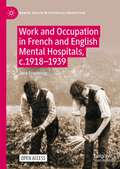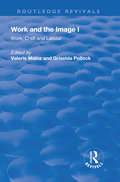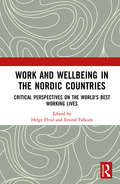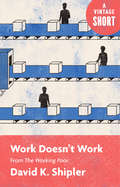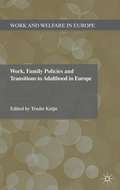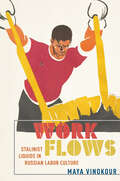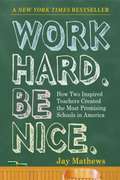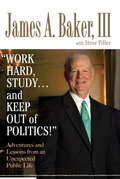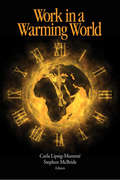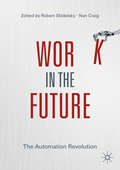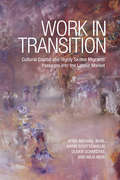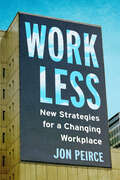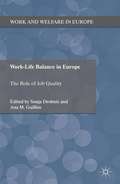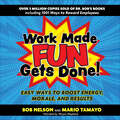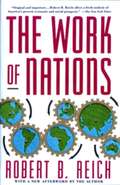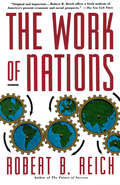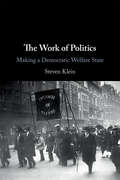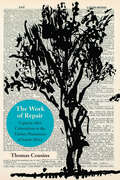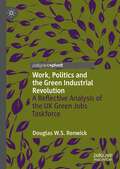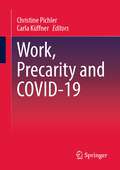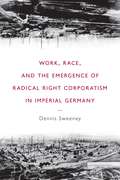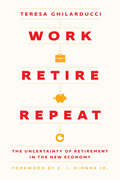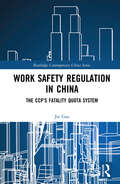- Table View
- List View
Work and Occupation in French and English Mental Hospitals, c.1918-1939 (Mental Health in Historical Perspective)
by Jane FreebodyThis open access book demonstrates that, while occupation has been used to treat the mentally disordered since the early nineteenth century, approaches to its use have varied across different countries and in different time periods. Comparing how occupation was used in French and English mental institutions between 1918 and 1939, one hundred years after the heyday of moral therapy, the book is an essential read for those researching the history of mental health and medicine more generally. It provides an overview of the legislation, management structures and financial conditions that affected mental institutions in France and England, and contributed to their differing responses to the new theories of occupational therapy emerging from the USA and Germany during the interwar period.
Work and the Image: Volume 1: Work, Craft and Labour - Visual Representations in Changing Histories (Routledge Revivals Ser.)
by Valerie Mainz Griselda PollockThis title was first published in 2000. "Work and the Image", published in two volumes, addresses a critical theme in contemporary social and cultural debates whose place in visual representation has been neglected. Ranging from Greek pottery to contemporary performance, and exploring a breadth of geo-national perspectives including those of France, Britain, Hungary, Soviet Russia, the Ukraine, Siberia and Germany, the essays provide a challenging reconsideration of the image of work, the meaning of the work process, and the complex issues around artistic activity as itself a form of work even as it offers a representation of labour. Volume I includes interdisciplinary case studies which plot the changing definitions of work as labour, craft, social relations and a source of historical identity, while analyzing the role of visual representation in their formation and transformation. The diverse essays cover such topics as anti-slavery movements and enunciation of workers' rights, revolutionary politics, relations of class and gender, industrial masculinities and women's rural sociality, unemployment and subjectivity, Stalinist aesthetics and nationalist identities.
Work and Wellbeing in the Nordic Countries: Critical Perspectives on the World's Best Working Lives
by Helge Hvid Eivind FalkumThe Nordic countries have the world's best working life. Unlike in many other countries, global competition has not created inequality, uncertainty, long working hours, standardization and restrictive managerial control. The main reason for this lies in the way interests are expressed and conflicts are resolved. Both employees and employers are well organized and both recognize the interests of the other. Working life develops in a constant interaction between conflict and compromise. This book examines working conditions in Norway, Denmark, Sweden and Finland. It explores how these good working conditions are created and maintained. The chapters explain: How work organization is formed How education, training and work place learning give access to the labour market How work is managed in the public sector How precarious work unfolds in the Nordic countries. Work and Wellbeing in the Nordic Countries is addressed to all those who have interest in the quality of working life. It will be of particular use to all students, academics and policy makers working in the fields of social policy, wellbeing, management studies, employment relations, work sociology and work psychology.
The Work At Home Sourcebook, 10th Edition
by Lynie ArdenThis indispensable directory by the author of "Franchises You Can Run From Home" contains information not found in any other book on the subject. The Work at Home Sourcebook gives specific information for finding, applying for, and getting work with AT&T, J. C. Penney, and more than 1,000 other companies that routinely hire qualified home-workers. Contact information, job descriptions and requirements, and details on pay and benefits are also included. Other chapters cover handicrafts, franchises, telecommuting, learning how to work at home, and ideas for businesses that can be started from home with a minimal investment. All of the information for this edition has been reviewed and updated and includes many new opportunities.
Work Doesn't Work: From The Working Poor
by David K. ShiplerAt the bottom of America’s working world, millions live in the shadow of prosperity, in the twilight of poverty and prosperity. Many are trapped for life in a perilous zone of low-wage work that keeps middle-class comforts and necessities forever beyond their reach despite the often long and hard hours they put in at their jobs, as bank tellers, food service employees, copyeditors, car washers and others. In his authoritative study of how our country has consistently and still is failing its working poor with low wages, diminished benefits and rampant instability, bestselling and Pulitzer Prize-winning author David K. Shipler draws on researched facts and scores of personal testimonies to paint a bleak of the short shrift that so many of us, even in a booming economy, are bound by. A Vintage Shorts Selection. An ebook short.
Work, Family Policies and Transitions to Adulthood in Europe
by Trudie KnijnThis book analyzes how the current generation of young adults enters the labour market and tries to create their own autonomous household, with or without children, exploring questions such as what does it mean to be a young adult in Europe today and what social policies help them to combine work and family life?
Work Flows: Stalinist Liquids in Russian Labor Culture (NIU Series in Slavic, East European, and Eurasian Studies)
by Maya VinokourWork Flows investigates the emergence of "flow" as a crucial metaphor within Russian labor culture since 1870. Maya Vinokour frames concern with fluid channeling as immanent to vertical power structures—whether that verticality derives from the state, as in Stalin's Soviet Union and present-day Russia, or from the proliferation of corporate monopolies, as in the contemporary Anglo-American West. Originating in pre-revolutionary bio-utopianism, the Russian rhetoric of liquids and flow reached an apotheosis during Stalin's First Five-Year Plan and re-emerged in post-Soviet "managed democracy" and Western neoliberalism.The literary, philosophical, and official texts that Work Flows examines give voice to the Stalinist ambition of reforging not merely individual bodies, but space and time themselves. By mobilizing the understudied thematic of fluidity, Vinokour offers insight into the nexus of philosophy, literature, and science that underpinned Stalinism and remains influential today. Work Flows demonstrates that Stalinism is not a historical phenomenon restricted to the period 1922-1953, but a symptom of modernity as it emerged in the twentieth century. Stalinism's legacy extends far beyond the bounds of the former Soviet Union, emerging in seemingly disparate settings like post-Soviet Russia and Silicon Valley.
Work Hard. Be Nice: How Two Inspired Teachers Created the Most Promising Schools in America
by Jay MathewsMIKE FEINBERG AND DAVE LEVIN were determined to learn how best to teach their low-income, at-risk students. Observing the methods of extraordinary teachers and eventually developing their own unconventional classroom model, these two young men overcame the obstacles and challenged the statistics to found a wildly successful nationwide network of public charter schools called the Knowledge is Power Program (KIPP).
'Work Hard, Study...and Keep Out of Politics!': Adventures and Lessons from an Unexpected Public Life
by James Robert BakerThe real inside story of why Gerald Ford did not ask Ronald Reagan to be his running mate in 1976-and why Reagan did not pick Ford in 1980; the battle over Florida 2000; the aborted White House job switch that inadvertently opened the door to the Iran-Contra scandal; the Bush campaign's wish that Dan Quayle would offer to resign from the ticket in 1992; the White House turmoil in the dark days following the Reagan assassination attempt; and a great deal more . . . White House Chief of Staff (twice), Secretary of State, Secretary of the Treasury, and campaign chairman for three different candidates in five successive presidential campaigns-few people have lived and breathed politics as deeply as James Baker. Now, with candor and Texas-style storytelling, and not a few surprises, he takes us into his thirty-five years behind the scenes. None of it was planned. His grandfather, the "Captain," drilled this advice into him: "Work hard, study . . . and keep out of politics!" Then a personal tragedy changed the life of a forty-year-old Texas Democratic lawyer and he never looked back. From campaign horsetrading, which sometimes got rough ("Politics ain't beanbag," says Baker), to the inner councils of the Reagan and Bush administrations to the controversies of today, Baker offers frank talk and spellbinding narratives, along with personal appraisals of six presidents and a constellation of others. It was a long, unexpected journey from Houston, Texas, to Washington, D.C.-and you'll want to travel it with him.
Work in a Warming World (Queen's Policy Studies Series #184)
by Carla Lipsig-Mummé Stephen McBrideGlobal warming is perhaps the greatest challenge facing the twenty-first century. Environmental polices on the one hand, and economic and labour market polices on the other, often exist in separate silos creating a dilemma that Work in a Warming World confronts. The world of work - goods, services, and resources - produces most of the greenhouse gases created by human activity. In engaging essays, contributors demonstrate how the world of work and the labour movement need to become involved in the struggle to slow global warming, and the ways in which environmental and economic policies need to be linked dynamically in order to effect positive change. Addressing the dichotomy of competing public policies in a Canadian context, Work in a Warming World presents ways of creating an effective response to global warming and key building blocks toward a national climate strategy.
Work in a Warming World
by Stephen Mcbride Carla Lipsig-MumméGlobal warming is perhaps the greatest challenge facing the twenty-first century. Environmental polices on the one hand, and economic and labour market polices on the other, often exist in separate silos creating a dilemma that Work in a Warming World confronts. The world of work - goods, services, and resources - produces most of the greenhouse gases created by human activity. In engaging essays, contributors demonstrate how the world of work and the labour movement need to become involved in the struggle to slow global warming, and the ways in which environmental and economic policies need to be linked dynamically in order to effect positive change. Addressing the dichotomy of competing public policies in a Canadian context, Work in a Warming World presents ways of creating an effective response to global warming and key building blocks toward a national climate strategy.
Work in the Future: The Automation Revolution
by Robert Skidelsky Nan CraigThis short, accessible book seeks to explore the future of work through the views and opinions of a range of expertise, encompassing economic, historical, technological, ethical and anthropological aspects of the debate. The transition to an automated society brings with it new challenges and a consideration for what has happened in the past; the editors of this book carefully steer the reader through future possibilities and policy outcomes, all the while recognising that whilst such a shift to a robotised society will be a gradual process, it is one that requires significant thought and consideration.
Work in Transition
by Anja Weiss Oliver Schmidtke Arnd-Michael Nohl Karin SchittenhelmDespite the fact that many countries target highly skilled migrants for recruitment in the global labour market, few of those migrants are able to take full advantage of their educational and professional qualifications in their new homes. Work in Transition examines this paradox, using extended narrative interviews that focus on the role that cultural capital plays in the labour market.Comparing the migrant experience in Germany, Canada, and Turkey, Work in Transition shows how migrants develop their cultural capital in order to enter the workforce, as well as how failure to leverage that capital can lead to permanent exclusion from professional positions. Exposing the mechanisms that drive inclusion and exclusion for migrants from a transatlantic comparative perspective, this book provides a unique analytical approach to an increasingly important global issue.
Work Less: New Strategies for a Changing Workplace
by Jon Peirce“Peirce tells the intriguing story of the battle for shorter hours … and why now is finally the moment for a breakthrough that would give us all more of the precious gift of time.” — LINDA McQUAIG, journalist and authorYou can’t have a healthy economy with an unhealthy work force. Work Less proposes ways to reduce work hours and keep workers happier, healthier, and more productive.Recent years have revealed just how stressed out many workers are. While the trend to longer hours has been developing for several decades, the trend’s effects have been aggravated during the pandemic by the growing use of Zoom and other new technologies for meetings with clients, customers, and co-workers.Exhausted and fed up, today’s workers are starting to insist on shorter hours and greater flexibility as to where they do their work. There is growing consensus that the forty-hour week, the norm since the 1940s, has outlived its usefulness. And there is an urgent need for new work schedules that adequately reflect the far greater intensity of work today, as well as the greater family demands on a labour force made up of almost fifty percent women, who bear the brunt of domestic duties.Work Less offers practical scheduling suggestions to employers and workers and numerous policy options for government policy-makers to improve working conditions.
Work-Life Balance in Europe: The Role of Job Quality (Work and Welfare in Europe)
by Sonja Drobnič Ana M. GuillénExamining the debate on quality of jobs in Europe, this book focuses on the work-life balance-a central element of the EU agenda. It addresses tensions between work and private life, examining job quality, job security, working conditions and time-use patterns of individuals and households as well as institutional contexts.
Work Made Fun Gets Done!: Easy Ways to Boost Energy, Morale, and Results
by Bob Nelson Mario TamayoBob Nelson, author of the multimillion-copy bestseller 1001 Ways to Reward Employees, and human performance expert Mario Tamayo offer hundreds of practical, creative tips for helping employees—and their managers—make work more fun.According to the employees that work for firms listed in Fortune's &“100 Best Companies to Work for in America,&” the most defining characteristic of these organizationsis they are all &“fun&” places to work. Fun is the secret sauce every business needs to better engage and motivate its employees today. Work Made Fun Gets Done! gives readers simple, practical ideas for instantly bringing fun into their work and workplace. Based on examples from scores of companies like Zoom, Pinterest, Bank of America, Zappos, Honda, Microsoft, and many more, this book provides clear examples of exactly what managers and employees alike can do to lighten the tone in the work environment and allow employees to have more fun at work. From AAA's &“Dump a Dog&” program where workers can pass their least-wanted project on to their manager and Houzz's complimentary office slippers to CARFAX's themed-wardrobe Zoom meetings and Google's company-approved Nerf-gun battles and paper airplane contests, you'll find dozens of ideas you can immediately adapt and implement in your own workplace. Work and fun have typically been considered polar opposites, but this book proves they can be integrated in ways that produce more motivated workers—and exceptional results.
The Work of Nations: Preparing Ourselves for 21st Century Capitalism
by Robert B. ReichWhat skills will be the most valuable in the coming century? How can our country ensure that all its citizens have a share in the new global economy? The author addresses these questions in a trail-blazing new book that is certain to guide a generation of policy makers.
The Work of Nations
by Robert B. ReichThere is no longer such a thing as an American economy, say Robert Reich at the beginning of this brilliant book. What does it mean to be a nation when money, goods, and services know no borders? What skills will be the most valuable in the coming century? And how can our country best ensure that all its citizen have a share in the new global economy? Robert B. Reich, the widely respected and bestselling author of The Next American Frontier and The Resurgent Liberal, defines the real challenge facing the United States in the 21st century in this trail-blazing book. Original, readable, and vastly informed, The Work of Nations is certain to set a standard for the next generation of policy-makers.From the Trade Paperback edition.
The Work of Politics: Making a Democratic Welfare State
by Steven KleinThe Work of Politics advances a new understanding of how democratic social movements work with welfare institutions to challenge structures of domination. Klein develops a novel theory that depicts welfare institutions as “worldly mediators,” or sites of democratic world-making fostering political empowerment and participation within the context of capitalist economic forces. Drawing on the writings of Weber, Arendt, and Habermas, and historical episodes that range from the workers' movement in Bismarck's Germany to post-war Swedish feminism, this book challenges us to rethink the distribution of power in society, as well as the fundamental concerns of democratic theory. Ranging across political theory and intellectual history, The Work of Politics provides a vital contribution to contemporary thinking about the future of the welfare state.
The Work of Repair: Capacity after Colonialism in the Timber Plantations of South Africa (Thinking from Elsewhere)
by Thomas CousinsIn the timber plantations in northeastern South Africa, laborers work long hours among tall, swaying lines of eucalypts, on land once theirs. In 2008, at the height of the HIV/AIDS crisis, timber corporations distributed hot cooked meals as a nutrition intervention to bolster falling productivity and profits. But life and sustenance are about much more than calories and machinic bodies. What is at stake is the nurturing of capacity across all domains of life—physical, relational, cosmological—in the form of amandla. An Nguni word meaning power, strength or capacity, amandla organizes ordinary concerns with one’s abilities to earn a wage, to strengthen one’s body, and to take care of others; it describes the potency of medicines and sexual vitality; and it captures a history of anti-colonial and anti-apartheid struggle for freedom.The ordinary actions coordinated by and directed at amandla do not obscure the wounding effects of plantation labor or the long history of racial oppression, but rather form the basis of what the Algerian artist Kader Attia calls repair. In this captivating ethnography, Cousins examines how amandla, as the primary material of the work of repair, anchors ordinary scenes of living and working in and around the plantations. As a space of exploitation that enables the global paper and packaging industry to extract labor power, the plantation depends on the availability of creative action in ordinary life to capitalize on bodily capacity. The Work of Repair is a fine-grained exploration of the relationships between laborers in the timber plantations of KwaZulu-Natal, and the historical decompositions and reinventions of the milieu of those livelihoods and lives. Offering a fresh approach to the existential, ethical and political stakes of ethnography from and of late liberal South Africa, the book attends to urgent questions of postapartheid life: the fate of employment; the role of the state in providing welfare and access to treatment; the regulation of popular curatives; the queering of kinship; and the future of custom and its territories. Through detailed descriptions, Cousins explicates the important and fragile techniques that constitute the work of repair: the effort to augment one’s capacity in a way that draws on, acknowledges, and reimagines the wounds of history, keeping open the possibility of a future through and with others.
Work, Politics and the Green Industrial Revolution: A Reflective Analysis of the UK Green Jobs Taskforce
by Douglas W.S. RenwickIn 2020, UK Prime Minister Boris Johnson launched The Green Jobs Taskforce, which extended and articulated the green jobs policy of his government and its position within conservative political ideology. This book critically highlights gaps in the political and business decision-making of his Taskforce, most notably on: the limited role of employers and HRM associations in skills building for staff in non-polluter industries (solar and wind); issues of a fair and just transition for workers losing jobs in the polluter industries (fossil fuels); and the lack of employee voice in both work arenas. The overtly pro-conservative and political nature of this UK Taskforce is also analyzed, which occurs and operates in opposition to British trade unions and the wider labor movement, by not prioritizing the just transition, alongside the extensive skills, training and passporting requirements that British workers need to gain decent, green jobs.This book is distinctive in offering the first in-depth analysis and critique of the UK Green Jobs Taskforce, in examining this Taskforce using conservative political ideas, and by critiquing it too. Little academic literature is available globally on the business impact and analysis of UK governmental sustainability policy, and this study can provide wider learning points, lessons and implications for other green job plans being formed and enacted in the EU, USA and other countries. It will be of great interest to academics and students of sustainability, HRM, organizational behavior, organization studies and employment relations.
Work, Precarity and COVID-19
by Christine Pichler Carla KüffnerThe anthology presents the social consequences of the COVID-19 pandemic in the field of work and gainful employment from a multidisciplinary perspective of social and economic sciences. Specifically, it deals with the analysis of changes in work processes and relations in the course of the COVID-19 pandemic. Different facets of the discussion are taken up, and the topic of "work, precarity and COVID-19" is discussed along a wide range of diversity categories (age, gender, disability, social origin, ethnicity, religion, etc.) and their intersections (intersectionality). At the same time, the focus is on discussing alternative models and ways of dealing with the current crisis that (re)establish social justice and inclusion through work.The translation was done with the help of artificial intelligence. A subsequent human revision was done primarily in terms of content.
Work, Race, and the Emergence of Radical Right Corporatism in Imperial Germany
by Dennis SweeneyIn the late nineteenth and early twentieth centuries, the Saar river valley was one of the three most productive heavy industrial regions in Germany and one of the main reference points for national debates over the organization of work in large-scale industry. Among Germany's leading opponents of trade unions, Saar employers were revered for their system of factory organization, which was both authoritarian and paternalistic, stressing discipline and punitive measures and seeking to regulate behavior on and off the job. In its repressive and beneficent dimensions, the Saar system provided a model for state labor and welfare policy during much of the 1880s and 1890s. Dennis Sweeney examines the relationship between labor relations in heavy industry and public life in the Saar as a means of tracing some of the wider political-ideological changes of the era. Focusing on the changing discourses, representations, and institutions that gave shape and meaning to factory work and labor conflict in the Saar,Work, Race, and the Emergence of Radical Right Corporatism in Imperial Germanydemonstrates the ways in which Saar factory culture and labor relations were constituted in wider fields of public discourse and anchored in the institutions of the local-regional public sphere and the German state. Of particular importance is the gradual transition in the Saar from a paternalistic workplace to a corporatist factory regime, a change that brought with it an authoritarian vision that ultimately converged with core elements in the ideological discourses of the German radical Right, including the National Socialists. This volume will be of interest to scholars and students of labor, industrial organization, ideology and political culture, and the genealogies of Nazism. Dennis Sweeney is Associate Professor of History at the University of Alberta. "The author makes a very insightful argument about the emergence of a kind of scientific racism within the new corporatism, one that brings biopolitics into German industry prior to the rise of National Socialism. This book will be an important contribution to the history of Imperial Germany, and has much potential to appeal to audiences in other fields of history. " ---Andrew Zimmerman, George Washington University
Work, Retire, Repeat: The Uncertainty of Retirement in the New Economy
by Teresa GhilarducciA damning portrait of the dire realities of retirement in the United States—and how we can fix it. While the French went on strike in 2023 to protest the increase in the national retirement age, workers in the United States have all but given up on the notion of dignified retirement for all. Instead, Americans—whose elders face the highest risk of poverty compared to workers in peer nations—are fed feel-good stories about Walmart clerks who can finally retire because a customer raised the necessary funds through a GoFundMe campaign. Many argue that the solution to the financial straits of American retirement is simple: people need to just work longer. Yet this call to work longer is misleading in a multitude of ways, including its endangering of the health of workers and its discrimination against people who work in lower-wage occupations. In Work, Retire, Repeat, Teresa Ghilarducci tells the stories of elders locked into jobs—not because they love to work but because they must. But this doesn’t need to be the reality. Work, Retire, Repeat shows how relatively low-cost changes to how we finance and manage retirement will allow people to truly choose how they spend their golden years.
Work Safety Regulation in China: The CCP’s Fatality Quota System (Routledge Contemporary China Series)
by Jie GaoFatality quotas implemented in China’s industrial sector are being used to promote work safety and therefore, reducing the number of work-related deaths. Given the controversial nature of this policy, Gao analyzes how the fatality quotas are functioning to aid the country in balancing economic growth and social stability. The book also examines significant implications caused of this policy’s implementation in the local regions, and reveals how local officials attempt to handle these problems. This is the first book to systematically examine the role of death indicators in work safety improvement in contemporary China, revealing insight into Beijing’s quota-oriented approach to policy-making.
